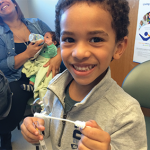Another study found that multiple common symptoms among seven-year-olds increased the risk of chronic widespread pain when those subjects were 45 years old, although researchers noted that the increased risk was modest and that reports of multiple symptoms in childhood are uncommon.2
Pain can have large effects on the chance of success in life, Dr. Connelly said. Studies have found links between chronic pain and declining grades and missed school time, with many children missing three months or more, he said.3,4
“That is enough to change dramatically their trajectory into adult life,” Dr. Connelly said. “For most kids, that means getting held back a grade. And, if you get held back a grade, your chances of graduating high school are essentially 50-50.”
Ripe for Further Study
Pediatric pain is ripe for further study, but Dr. Connelly said there are important considerations when tackling this kind of research. The tools used to assess pain should be different for kids than for adults, and the developmental levels within pediatrics cross a much wider range than they do in adulthood.
An 18-year-old can be seen as somewhat comparable to other adults, he said. But “within pediatrics, year by year you’re targeting a moving population, with enormous changes in immunological, psychosocial, and neurological development. So there’s a huge developmental range. When you’re enrolling kids in studies, an eight-year-old is very, very different than a 13-year-old.”
Ethical Considerations
In another talk in the session, Joseph Ali, JD, research scientist with the Johns Hopkins Berman Institute of Bioethics in Baltimore, said there are special ethical considerations in studies on pediatric pain, especially nontherapeutic research.
One recent survey of respondents from the United States, Canada, Europe, and Australia looked at 41 studies involving 16 researchers and about 3,000 pediatric participants involved in cold-pressor-task (CPT) studies, in which the arm is placed in a tank of cold water to evaluate pain.5
According to the researchers surveyed, the Institutional Review Board (IRB) “burden” experienced when seeking ethical approval for pediatric nontherapeutic cold-pressor research was comparable to that of other pediatric studies. Just one of the researchers could not get approval from an IRB, and most of the studies underwent full IRB review, with three expedited because they were considered minimal risk. The overall adverse event rate was less than 0.07%.
A majority of the pain researchers (63%) also reported receiving generally positive feedback from families after the children completed the CPT, while 44% reported negative feedback from at least one child, resulting in complaints or withdrawal of data.

